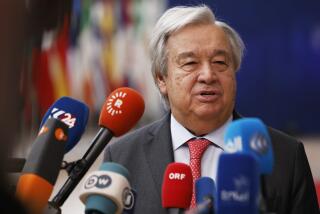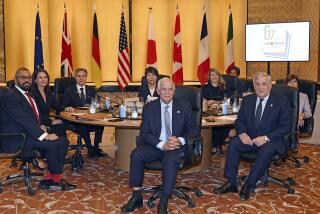W. Europeans Assail Hussein’s Use of Hostages
- Share via
ROME — Standing firm with the United States, the leaders of Western Europe on Sunday denounced Saddam Hussein’s “unscrupulous use” of foreign hostages trapped in Iraq for what they called “the sole and vain purpose of trying to divide the international community.”
The European Community, in a tough, united stand, warned Hussein that its 12 governments would not negotiate individually for the hostages and would discourage private initiatives seeking their release. They stressed pointedly that the community would keep open the option of U.N.-sanctioned military force to drive Iraq from Kuwait.
In a closing declaration at the end of a two-day summit here, the 12 heads of government, meeting as the European Council, asked U.N. Secretary General Javier Perez de Cuellar to send a special representative to Iraq to demand the immediate release of all foreign hostages held there.
Condemning the “destructive occupation of Kuwait,” the declaration said the European Council “demands that Iraq immediately, completely and unconditionally withdraw its forces.”
The weekend encounter in a soggy Rome marked the European Community’s first summit of heads of government since the Iraqi invasion of Kuwait on Aug. 2. And, amid signs of weakening international resolve, it produced the sort of reinforcement for the American hard line against Iraq that President Bush had sought in a phone call Saturday to Italian Prime Minister Giulio Andreotti.
“The member states of the European Community reaffirm their total solidarity in achieving the freedom of all foreign citizens trapped in Iraq and Kuwait and denounce the unscrupulous use which Iraq is making of them with the sole and vain purpose of trying to divide the international community,” Sunday’s closing declaration said. “They unreservedly condemn this maneuver, which, carried out in contempt of the most basic humanitarian rules, can only complicate prospects for a solution to the crisis.”
Vowing “scrupulously to adhere to the embargo” and other U.N. actions against Iraq, the Europeans said they are “also prepared to consider additional steps consistent with the U.N. Charter.” In diplomatic language, that means the willingness to consider military action.
Italy and other members of the European Community have been outraged by what they consider Hussein’s crude and transparent efforts to divide his international opponents by releasing groups of foreign nationals.
Last week, Hussein released 25 Portuguese citizens--stonemasons who had been installing marble on the walls of a government palace--and today more than 300 French citizens are expected to be flown home.
France, which is maintaining one of the largest military forces in the gulf region, assured its European partners that there had been no bargain struck with Iraq for the hostage release.
French President Francois Mitterrand voiced support for the joint declaration, and Irish Prime Minister Charles Haughey said that as a result of it, he would encourage Irish lawmakers to scrap a planned visit to Iraq on behalf of 150 Irish nationals there.
“Hussein must not gain anything from his aggression,” British Prime Minister Margaret Thatcher said in summarizing European resolve.
In European affairs, the EC agreed, over British objections, to take a major new step toward economic and monetary union by creating a common central bank by Jan. 1, 1994.
“We are building the right road,” said Prime Minister Andreotti, voicing the all-but-unanimous support for a common bank and eventual single European currency as the next steps of economic integration due to begin at the end of 1992.
“We will not have a single currency imposed on us,” Thatcher said. “A common currency, yes, a single currency, no. I would never put forward the abolition of sterling to Parliament.”
The British, who insist that integration must not mean surrender of sovereignty, also left without hard-sought agreement to reduce community agricultural subsidies by 30% as part of an international agreement to cut tariffs. The subsidy cut, opposed by France, Ireland and Germany--present at an EC meeting as a united nation for the first time--is being urged by the United States, whose agricultural exports would become more competitive.
More to Read
Sign up for Essential California
The most important California stories and recommendations in your inbox every morning.
You may occasionally receive promotional content from the Los Angeles Times.










